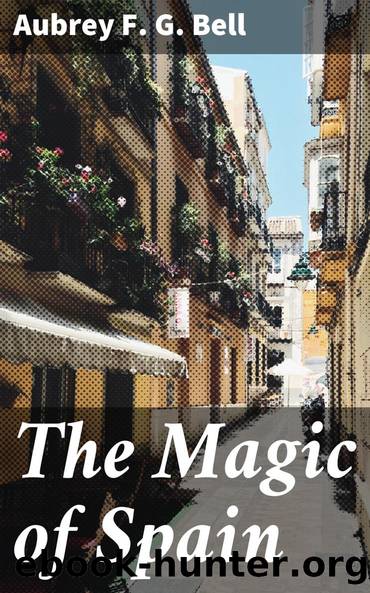The Magic of Spain by Aubrey F. G. Bell

Author:Aubrey F. G. Bell [Bell, Aubrey F. G.]
Language: eng
Format: epub
Tags: Nonfiction, Travel, History
ISBN: 4064066168469
Google: 4jBHAAAAIAAJ
Barnesnoble:
Publisher: Good Press
Published: 2018-09-17T00:00:00+00:00
III.âIn a Valladolid Dungeon.
Table of Contents
The order of imprisonment was issued on the 26th of February, 1572. His goods were to be confiscated with the exception of a bed and forty ducats to provide for his food in prison. He was to be seized, wherever found, âin church, monastery, or other sacred place,â and he was to bring with him nothing but clothes and linen. A curious clause adds that âbeasts of burden to carry him and his bed, etc., are to be provided at the customary price, and the price is not to be raised.â He was thus arrested and conducted to Valladolid. The following description of the prison is given in the trial of Carranza, Archbishop of Toledo, who had been confined there some ten years before. âThe prison consisted of two rooms, one for him and one for two servants. They were so remote that the Archbishop heard nothing of a fire which broke out on the 21st of September, 1561, and, lasting for a day and a half, consumed more than four hundred houses, some of them close to the secret prison. The stench was so intolerable that they were obliged at times to beg that the doors might be opened, or they would be suffocated. The infection of the place rendered both master and servants seriously ill, and the doctors of the Holy Office reported that it was indispensable to bathe the apartment in pure air morning and evening. In consequence the Inquisitors arranged that a grating should be made in the door, a device which the Archbishop scorned as adding insult to injury. The rooms were not swept ... the shutters of the windows were kept closed, and on some days the Archbishop had to light a candle at nine in the morning. The food was brought on broken plates; the sheets served as table-cloth....â In a letter written to Philip II., after two years of imprisonment, the Archbishop says, âI fear and expect death daily, and to this end my treatment seems to have been directed ever since I came here.â The loss of sun and light, and the actual dirtiness and horror of the place must have been utterly repulsive to a man of Luis de Leónâs temperament. In one of his writings, âLa Perfecta Casada,â he says, âIs not cleanliness the fountain head of beautyâthe first and greater part of it?â He loved the open air, and was wont to regret the loss of liberty which even his duties as professor at Salamanca entailed. But to the actual and severe hardships to be undergone there was added, for the devout Catholic, the more subtle and indefinite torture of the mind. For he could not be certain that by some involuntary sin he had not incurred degradation in this life, and punishment unceasing in the next, and in the loneliness and gloom of the prison these doubts would often recur. Luis de León acknowledged the full authority of the Inquisition, and his unqualified submission was not forced or hypocritical, but the fruit of a sincere conviction.
Download
This site does not store any files on its server. We only index and link to content provided by other sites. Please contact the content providers to delete copyright contents if any and email us, we'll remove relevant links or contents immediately.
Room 212 by Kate Stewart(5089)
The Crown by Robert Lacey(4784)
Endurance: Shackleton's Incredible Voyage by Alfred Lansing(4743)
The Iron Duke by The Iron Duke(4334)
The Rape of Nanking by Iris Chang(4189)
Joan of Arc by Mary Gordon(4076)
Killing England by Bill O'Reilly(3986)
Say Nothing by Patrick Radden Keefe(3964)
I'll Give You the Sun by Jandy Nelson(3414)
Shadow of Night by Deborah Harkness(3339)
Hitler's Monsters by Eric Kurlander(3317)
Mary, Queen of Scots, and the Murder of Lord Darnley by Alison Weir(3188)
Blood and Sand by Alex Von Tunzelmann(3180)
Eleanor & Park by Rainbow Rowell(3139)
Darkest Hour by Anthony McCarten(3112)
Margaret Thatcher: The Autobiography by Thatcher Margaret(3064)
Book of Life by Deborah Harkness(2913)
Red Famine: Stalin's War on Ukraine by Anne Applebaum(2908)
The One Memory of Flora Banks by Emily Barr(2846)
